American Academy of Arts and Sciences美国艺术与科学学院
英语中的“协会”
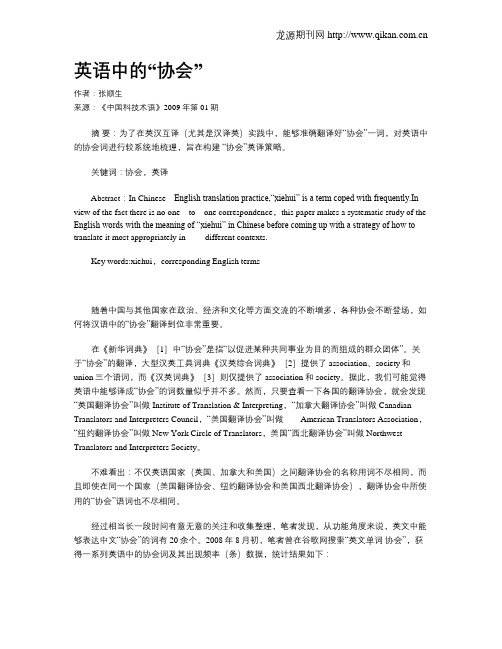
英语中的“协会”作者:张顺生来源:《中国科技术语》2009年第01期摘要:为了在英汉互译(尤其是汉译英)实践中,能够准确翻译好“协会”一词,对英语中的协会词进行较系统地梳理,旨在构建“协会”英译策略。
关键词:协会,英译Abstract:view of the fact there ,this paper makes a systematic study of the English words with the meaning of “xiehui” in Chinese before coming up with a strategy of how toKey words:xiehui,corresponding English terms随着中国与其他国家在政治、经济和文化等方面交流的不断增多,各种协会不断登场,如何将汉语中的“协会”翻译到位非常重要。
在《新华词典》[1]中“协会”是指“以促进某种共同事业为目的而组成的群众团体”。
关于“协会”的翻译,大型汉英工具词典《汉英综合词典》[2]提供了association、society和union三个语词,而《汉英词典》[3]则仅提供了association和society。
据此,我们可能觉得英语中能够译成“协会”的词数量似乎并不多。
然而,只要查看一下各国的翻译协会,就会发现“英国翻译协会”叫做Institute of Translation & Interpreting,“加拿大翻译协会”叫做Canadian Translators and Interpreters Council,“美国翻译协会”叫做,“纽约翻译协会”叫做New York Circle of Translators,美国“西北翻译协会”叫做Northwest Translators and Interpreters Society。
不难看出:不仅英语国家(英国、加拿大和美国)之间翻译协会的名称用词不尽相同,而且即使在同一个国家(美国翻译协会、纽约翻译协会和美国西北翻译协会),翻译协会中所使用的“协会”语词也不尽相同。
美国艺术与文学学院奖
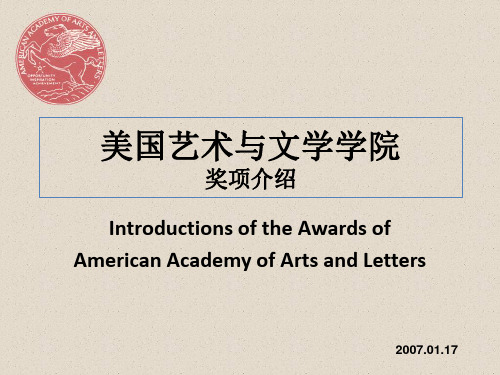
Arts)
奖项名称及概况 brief introduction of the awards
美国艺术与文学学院
奖项介绍 Introductions of the Awards of American Academy of Arts and Letters
2007.01.17
前言 brief introductions of the contents
•
本片介绍了在建筑界具有极高威望的美国艺术与文学学院的相关奖
奖项名称及概况 brief introduction of the awards
• 20. Rome Fellowship in Literature • 21. Medal for Spoken Language • 22. The Mildred and Harold Strauss Livings • 23. Harold D. Vursell Memorial Award • 24. Morton Dauwen Zabel Award者
• 1977年考入原南京工学院( 现东南大学)建筑系。
• 1981年赴美自费留学。先后 在美国保尔州立大学和伯克利加 利福尼亚大学建筑系分别获得环 境设计理学士和建筑硕士学位。 在校时获得美国建筑师协会和基 金会奖金。
• 1984年毕业后曾先后在美国旧金 山一些建筑设计事务所工作。
金,后来争取在美国院士委员会的席位进还说服Mrs. Elizabeth Cochran
2022美国十大艺术学院排名一览表
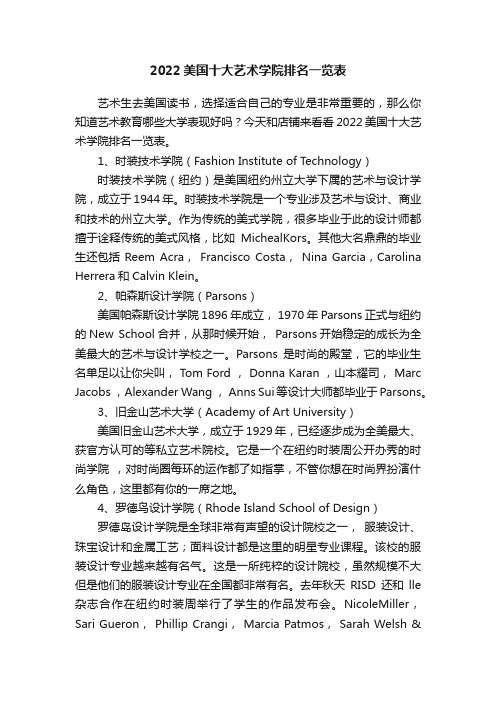
2022美国十大艺术学院排名一览表艺术生去美国读书,选择适合自己的专业是非常重要的,那么你知道艺术教育哪些大学表现好吗?今天和店铺来看看2022美国十大艺术学院排名一览表。
1、时装技术学院(Fashion Institute of Technology)时装技术学院(纽约)是美国纽约州立大学下属的艺术与设计学院,成立于1944年。
时装技术学院是一个专业涉及艺术与设计、商业和技术的州立大学。
作为传统的美式学院,很多毕业于此的设计师都擅于诠释传统的美式风格,比如MichealKors。
其他大名鼎鼎的毕业生还包括Reem Acra,Francisco Costa,Nina Garcia,Carolina Herrera和Calvin Klein。
2、帕森斯设计学院(Parsons)美国帕森斯设计学院1896年成立, 1970年Parsons正式与纽约的New School合并,从那时候开始,Parsons开始稳定的成长为全美最大的艺术与设计学校之一。
Parsons是时尚的殿堂,它的毕业生名单足以让你尖叫, Tom Ford , Donna Karan ,山本耀司, Marc Jacobs ,Alexander Wang , Anns Sui等设计大师都毕业于Parsons。
3、旧金山艺术大学(Academy of Art University)美国旧金山艺术大学,成立于1929年,已经逐步成为全美最大、获官方认可的等私立艺术院校。
它是一个在纽约时装周公开办秀的时尚学院,对时尚圈每环的运作都了如指掌,不管你想在时尚界扮演什么角色,这里都有你的一席之地。
4、罗德鸟设计学院(Rhode Island School of Design)罗德岛设计学院是全球非常有声望的设计院校之一,服装设计、珠宝设计和金属工艺;面料设计都是这里的明星专业课程。
该校的服装设计专业越来越有名气。
这是一所纯粹的设计院校,虽然规模不大但是他们的服装设计专业在全国都非常有名。
奥斯卡英文介绍

“Oscar,” the origin of the name are not the same. The more credible is this story~~~~~
1931 Academy of Motion Picture Arts and Sciences Library administrator Margaret in a closer look after the Awards,exclaimed: "ah! He looks just like my uncle Oscar!“A journalist next door heard and wrote: "Art and Science of staff passionately call the golden statue as Oscar.“ Since then, the name Oscar spread like wildfire.
at lat prize did he get?
Best Actor
Leonardo DiCaprio – The Revenant Playing a 19th-century huntsman, he endured punishing sub-zero temperatures and ate raw buffalo liver while shooting the film. He's already been rewarded for his efforts, having scooped up Best Actor trophies at this year's Baftas and Golden Globes.
Everyone is very happy,same as the United Nations
杨培东 戴宏杰简介

Peidong Yang (simplified Chinese: 杨培东born 1971) is a Chinese-born American chemist and material scientist. He is currently a Professor at the University of California, Berkeley (since 1999), member of the American Academy of Arts and Sciences. He is a Professor of Chemistry and a Professor of Materials Science.His research group studies the synthesis of nanomaterials and their electronic and optical properties. He is also a Department Head at the Joint Center for Artificial Photosynthesis,Senior Faculty Scientist at Lawrence Berkeley National Laboratory, and Deputy Directted Nanomechanical Systems (COINS).He is an associate editor of the Journal of the American Chemical Society.
Peidong received a B.A. in Chemistry from the University of Science and Technology of China in 1993. For his graduate studies, he worked with Charles M. Lieber at Harvard University, and in 1997, he was awarded a Ph.D. in Chemistry. He was a post-doctoral fellow with Galen D. Stucky at University of California, Santa Barbara from 1997–1999, until being hired as an assistant professor in Chemistry at University of California, Berkeley, where he was granted tenure in 2004.
有关奥斯卡奖的介绍英文版上课讲义
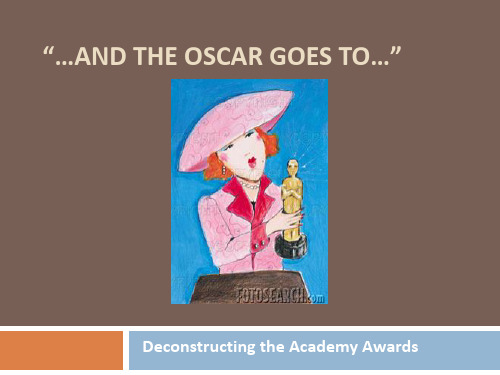
• expensive stars appear on TV for free
• cheaper to produce than movie or mini-series.
No Image
Oscar Money-Maker #3: The Movie Industry
The Oscars as a Media Event
No Image
33% of all Canadians watch all or part of the Oscars (48% adult women, 40% adult men, 12% children)
The Oscars as a Commodity
No Image
Oscar Money-Maker #5: The Movie Studios
When are most Oscar potentials released? Why?
• December, to catch the holiday rush, and to ensure that movies are still in theatres.
Which winning movies don’t make much off the Oscars?
• Movies no longer in the theatre • Winners other than Best Picture
No Image
The Oscars as a Contest
AMPAS members nominate 5 and pick 1 winner
电影名词解释
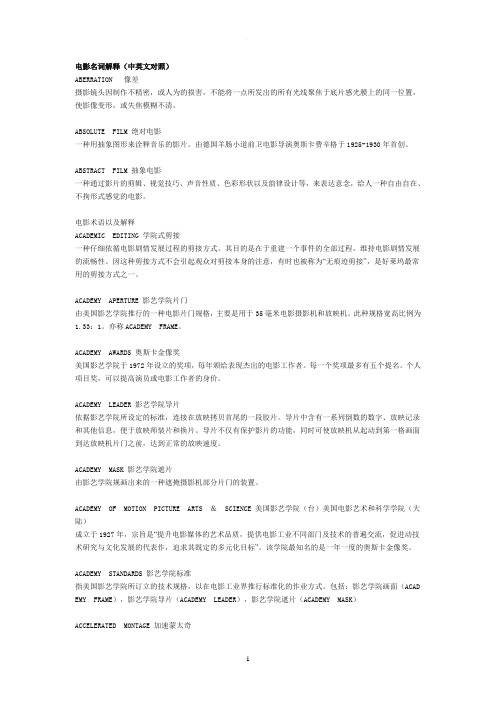
电影名词解释(中英文对照)ABERRATION 像差摄影镜头因制作不精密,或人为的损害,不能将一点所发出的所有光线聚焦于底片感光膜上的同一位置,使影像变形,或失焦模糊不清。
ABSOLUTE FILM 绝对电影一种用抽象图形来诠释音乐的影片。
由德国羊肠小道前卫电影导演奥斯卡费辛格于1925-1930年首创。
ABSTRACT FILM 抽象电影一种通过影片的剪辑、视觉技巧、声音性质、色彩形状以及韵律设计等,来表达意念,给人一种自由自在、不拘形式感觉的电影。
电影术语以及解释ACADEMIC EDITING 学院式剪接一种仔细依循电影剧情发展过程的剪接方式。
其目的是在于重建一个事件的全部过程,维持电影剧情发展的流畅性。
因这种剪接方式不会引起观众对剪接本身的注意,有时也被称为“无痕迹剪接”,是好莱坞最常用的剪接方式之一。
ACADEMY APERTURE 影艺学院片门由美国影艺学院推行的一种电影片门规格,主要是用于35毫米电影摄影机和放映机。
此种规格宽高比例为1.33:1。
亦称ACADEMY FRAME。
ACADEMY AWARDS 奥斯卡金像奖美国影艺学院于1972年设立的奖项,每年颁给表现杰出的电影工作者。
每一个奖项最多有五个提名。
个人项目奖,可以提高演员或电影工作者的身价。
ACADEMY LEADER 影艺学院导片依据影艺学院所设定的标准,连接在放映拷贝首尾的一段胶片。
导片中含有一系列倒数的数字、放映记录和其他信息,便于放映师装片和换片。
导片不仅有保护影片的功能,同时可使放映机从起动到第一格画面到达放映机片门之前,达到正常的放映速度。
ACADEMY MASK 影艺学院遮片由影艺学院规画出来的一种遮掩摄影机部分片门的装置。
ACADEMY OF MOTION PICTURE ARTS &SCIENCE 美国影艺学院(台)美国电影艺术和科学学院(大陆)成立于1927年,宗旨是“提升电影媒体的艺术品质,提供电影工业不同部门及技术的普遍交流,促进动技术研究与文化发展的代表作,追求其既定的多元化目标”。
American literature美国文学
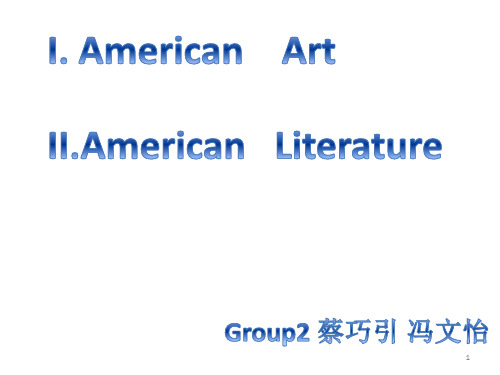
45
46
47
48
49
50
51
52
53
28
《灰与黑的协奏曲:画家母亲肖像》
29
《白衣少女》或称《白色交响曲》
30
《泰晤士河》
31
《黑色与金色下的夜曲:坠落的烟 火》
32
• 美国文学
33
•
美国文学表现为多元化,热爱 自由,追求以个人幸福为中心的美 国梦。美国文学大致出现过3次繁荣: 19世纪前期形成民族文学,第一和 第二次世界大战后,美国文学两度 繁荣,并产生世界影响,已有近10 位作家获得诺贝尔文学奖。
托马斯· 杰弗逊
37
早期浪漫主义文学
• 19C初,一些以美国为背景、 美国人为主人公的作品开始 出现,初具美利坚民族的特 色。欧文(1783~1859)致力 发掘北美早期移民的传说故 事。《见闻札记》
38
欧文(1783~1859)
《睡谷的传说》 讲述了睡谷附近一个 美丽的山村塔里敦里, 乡村教师伊卡博 德· 克莱恩偶遇“无 头骑士”的故事。
11
《波依特的四个女儿》
12
《康乃馨、百合与玫瑰花》是萨金特表现瞬间光影效果最突出、最著名的一幅 油画。这幅画是他精心制作的传世经典作品,描绘了孩子在花丛中点灯笼的情景。 这幅画的题材们是无关紧要的,最具有魅力的是画面千变万化的丰富色彩,令人赏 心悦目,虽然重视色彩的表现,但花的形状历历可见,丰富的色彩和花的芬芳融为一 体。现收藏在伦敦泰德画廊
6
“哦,不,报歉我不能和你玩了,我还要温书。”
7
“哦亲爱的大夫,我的娃娃生病了,很难受,您帮我给他看看吧。” “ 嗯,善良的好孩子,我来听听啊,哪儿的问题呢?”
8
- 1、下载文档前请自行甄别文档内容的完整性,平台不提供额外的编辑、内容补充、找答案等附加服务。
- 2、"仅部分预览"的文档,不可在线预览部分如存在完整性等问题,可反馈申请退款(可完整预览的文档不适用该条件!)。
- 3、如文档侵犯您的权益,请联系客服反馈,我们会尽快为您处理(人工客服工作时间:9:00-18:30)。
American Academy of Arts and SciencesFrom Wikipedia, the free encyclopediaJump to: navigation, searchCoordinates : 42°22′51″N 71°06′37″W42.380755°N 71.110256°WThe House of the Academy, Cambridge, Massachusetts.The American Academy of Arts and Sciences (American Academy) is one of the oldest and most prestigious honorary societies and a leading center for independent policy research in the United States. Election to the Academy is considered one of the nation’s highest honors since its founding during the American Revolution by John Adams, John Hancock, James Bowdoin and other scholar-patriots who contributed prominently to the establishment of the new nation, its government, and its Constitution.[1]Today the Academy is with a dual function: to elect to membership finest minds and most influential leaders, drawn from science, scholarship, business, public affairs, and the arts, from each generation, and to conduct policy studies in response to the needs of society. Major Academy projects now have focused on higher education and research, humanities and cultural studies, scientific and technological advances, politics, population and the environment, and the welfare of children. Dædalus, the Academy’s quar terly journal, is widely regarded as one of the world's leading intellectual journals.[2]The Academy is headquartered in Cambridge, Massachusetts. Contents[hide]∙ 1 Overview∙ 2 Membershipo 2.1 Founding memberso 2.2 Memberso 2.3 Classes and sections∙ 3 Presidents, 1791-present∙ 4 Activitieso 4.1 Projectso 4.2 Research fellowship programso 4.3 Awardso 4.4 National Commission on the Humanities and Social Sciences ∙ 5 See also∙ 6 External links∙7 References[edit] OverviewThe Academy was established by Massachusetts legislature on 4 May 1780. Its purpose, as described in its Charter of Incorporation, is "to cultivate every art and science which may tend to advance the interest, honor, dignity, and happiness of a free, independent, and virtuous people."[3] The sixty-two incorporating fellows represented varying interests and high standing in the political, professional, and commercial sectors of the state. The first class of new members, chosen by the Academy in 1781, included Benjamin Franklin and George Washington as well as several foreign honorary members. The initial volume of Academy Memoirs appeared in 1785, and the Proceedings followed in 1846. In the 1950s the Academy launched its journal Daedalus, reflecting its commitment to a broader intellectual and socially-oriented program.[4]The Academy has sponsored a number of awards throughout its history. Its first award, established in 1796 by Benjamin Thompson (Count Rumford), honored distinguished work on "heat and light" and provided support for research activities. Additional prizes recognized important contributions in the sciences, social sciences, and humanities. In 2000, a scholar-patriot award was inaugurated to honor individuals who have made significant contributions to the work of the Academy and whose lives exemplify the founders' vision of service to society.Since the second half of the twentieth century, policy research has become a central focus of the Academy. In the late 1950s, arms control emerged as a signature concern of the Academy. The Academy also served as the catalyst in establishing the National Humanities Center in North Carolina. In the late 1990s, the Academy developed a new strategic plan, focusing on four major areas: science, technology, and global security; social policy and education; humanities and culture; and education. In 2002, the Academy established a visiting scholars program in association with Harvard University. Now a group of 54 academic institutions from acrossthe country have become university affiliates of the Academy to support this program.[5][edit] Membership[edit] Founding membersCharter members of the Academy are Samuel Adams, John Adams, John Bacon, James Bowdoin, Charles Chauncy, John Clark, David Cobb, Samuel Cooper, Thomas Cushing, Nathan Cushing, William Cushing, Tristram Dalton, Francis Dana, Samuel Deane, Perez Fobes, Caleb Gannett, Henry Gardner, Benjamin Guild, John Hancock, Joseph Hawley, Edward Augustus Holyoke, Ebenezer Hunt, Jonathan Jackson, Charles Jarvis, Samuel Langdon, Levi Lincoln, Daniel Little, Elijah Lothrup, John Lowell, Samuel Mather, Samuel Moody, Andrew Oliver, Joseph Orne, Theodore Parsons, George Partridge, Robert Treat Paine, Phillips Payson, Samuel Phillips, Jr., John Pickering, Oliver Prescott, Zedekiah Sanger, Nathaniel Peaslee Sargeant, Micajah Sawyer, Theodore Sedgwick, William Sever, Stephen Sewall, David Sewall, John Sprague, Ebenezer Storer, Caleb Strong, James Sullivan, John Bernard Sweat, Nathaniel Tracy, Cotton Tufts, James Warren, Samuel West, Edward Wigglesworth, Joseph Willard, Samuel Williams, Abraham Williams, Nehemiah Williams, and James Winthrop.[edit] MembersFrom the beginning, the membership, nominated and elected by peers, has included not only scientists and scholars but also writers and artists as well as representatives from the full range of professions and public life. Throughout the Academy’s history, 10,000 fellows have been elected, including such notables as John Adams, Thomas Jefferson, John James Audubon, Joseph Henry, Washington Irving, Josiah Willard Gibbs, Augustus Saint-Gaudens, J. Robert Oppenheimer, Willa Cather, T. S. Eliot, Edward R. Murrow, Jonas Salk, Eudora Welty, and Duke Ellington. Foreign honorary members have included Leonhard Euler, Marquis de Lafayette, Alexander von Humboldt, Leopold von Ranke, Charles Darwin, Jawaharlal Nehru, Werner Heisenberg, and Alec Guinness. Astronomer Maria Mitchell was the first woman to be elected to the Academy, in 1848. The current membership encompasses over 4,000 fellows and foreign honorary members on the roster, including more than 250 Nobel laureates and more than 60 Pulitzer Prize winners.[6][edit] Classes and sectionsThe current membership is divided into five classes and twenty-four sections.[7]Class I – Mathematical and Physical Sciences∙Section 1. Mathematics∙Section 2. Physics∙Section 3. Chemistry∙Section 4. Astronomy (including Astrophysics) and Earth Science ∙Section 5. Engineering Sciences and Technologies∙Section 6. Computer Sciences (including Artificial Intelligence and Information Technologies)Class II – Biological Sciences∙Section 1. Biochemistry and Molecular Biology∙Section 2. Cellular and Developmental Biology, Microbiology and Immunology (including Genetics)∙Section 3. Neurosciences, Cognitive Sciences, and Behavioral Biology∙Section 4. Evolutionary and Population Biology and Ecology∙Section 5. Medical Sciences (including Physiology and Pharmacology), Clinical Medicine, and Public HealthClass III – Social Sciences∙Section 1. Social and Developmental Psychology and Education ∙Section 2. Economics∙Section 3. Political Science, International Relations, and Public Policy∙Section 4. Law (including the Practice of Law)∙Section 5. Archaeology, Anthropology, Sociology, Geography and DemographyClass IV – Arts and Humanities∙Section 1. Philosophy and Religious Studies∙Section 2. History∙Section 3. Literary Criticism (including Philology)∙Section 4. Literature (Fiction, Poetry, Short Stories, Nonfiction, Playwriting, Screenwriting)∙Section 5. Visual Arts and Performing ArtsClass V – Public affairs, business, and administration ∙Section 1. Public Affairs, Journalism, and Communications∙Section 2. Business, Corporate and Philanthropic Leadership ∙Section 3. Educational, Scientific, Cultural and Philanthropic Administration[edit] Presidents, 1791-present∙1791–1814 John Adams∙1814–1820 Edward Augustus Holyoke∙1820–1829 John Quincy Adams∙1829–1838 Nathaniel Bowditch∙1838–1839 James Jackson[disambiguation needed]∙1839–1846 John Pickering[disambiguation needed]∙1846–1863 Jacob Bigelow∙1863–1873 Asa Gray∙1873–1880 Charles Francis Adams∙1880–1892 Joseph Lovering∙1892–1894 Josiah Parsons Cooke∙1894–1903 Alexander Agassiz∙1903–1908 William Watson Goodwin∙1908–1915 John Trowbridge∙1915–1917 Henry Pickering Walcott∙1917–1919 Charles Pickering Bowditch∙1919–1921 Theodore William Richards∙1921–1924 George Foot Moore∙1924–1927 Theodore Lyman∙1927–1931 Edwin Bidwell Wilson∙1931–1933 Jeremiah D. M. Ford∙1933–1935 George Howard Parker∙1935–1937 Roscoe Pound∙1937–1939 Dugald C. Jackson∙1939–1944 Harlow Shapley∙1944–1951 Howard Mumford Jones∙1951–1954 Edwin Herbert Land∙1954–1957 John Ely Burchard∙1957–1961 Kirtley Fletcher Mather∙1961–1964 Hudson Hoagland∙1964–1967 Paul A. Freund∙1967–1971 Talcott Parsons∙1971–1976 Harvey Brooks∙1976–1979 Victor Frederick Weisskopf∙1979–1982 Milton Katz∙1982–1986 Herman Feshbach∙1986–1989 Edward Hirsch Levi∙1989–1994 Leo Leroy Beranek∙1994–1997 Jaroslav Pelikan∙1997–2000 Daniel C. Tosteson∙2000–2001 James O. Freedman∙2001–2006 Patricia Meyer Spacks∙2006–2009 Emilio Bizzi∙2010–present Leslie C. Berlowitz[edit] ActivitiesThe Academy carries out nonpartisan policy research by bringing together scientists, scholars, artists, policymakers, business leaders, and other experts to make multidisciplinary analyses of complex social, political, and intellectual topics. The Committee on Studies is responsible for reviewing and approving all studies undertaken in the name of the Academy and helping to identify proposed studies that will make optimum use of Academy expertise and resources. The Committee on Studies works closely with the Committee on Publications to ensure that Academy project reports and publications enhance the stature of the institution and the visibility of its intellectual contributions to the scholarly and policy communities and to the public at large.[edit] ProjectsThe Academy's four major program areas are:∙Science, Technology, and Global Security: Explore how the international community can devise new cooperative structures to improve global security, analyzes the impact of rapid developments in science and technology, and develops policies to govern these transformations.∙Social Policy and American Institutions: Carry out studies that focus on American institutions at the crossroads, particularly the government and the corporation.∙Humanities and Culture: Enhance public understanding of the value and role of the humanities in American life and create new resources to inform coherent policy analyses relative to the humanities.∙Education: Deal with education at all levels—from primary and secondary education to teaching and research at the universitylevel.[edit] Research fellowship programsVisiting Scholars Program: An interdisciplinary research fellowship housed at the headquarter of the Academy in Cambridge, Massachusetts, with a purpose is to stimulate and support scholarly work by promising scholars and practitioners in the early stages of their careers and to foster exchange between an emerging generation of scholars and Academy members with shared interests.Hellman Fellowship in Science and Technology Policy: A research fellowship for early-career professional with training in science or engineering who is interested in transitioning to a career in public policy and administration. While in residence at the headquarter of the Academy, the Hellman Fellow will work with senior scientists and policy experts on critical national and international policy issues related to science, engineering, and technology.[edit] Awards∙Scholar-Patriot AwardThis award, founded in 2000, recognizes the extraordinary contributions of individuals who share the commitment of the Academy's founders, a group of patriots who devoted their lives to promoting the arts and sciences in service to the nation.∙Founders AwardEstablished in the 225th anniversary year of the Academy, this award honors men, women and institutions that have advanced the ideals of the founders of the Academy. Recipients embody the spirit of the founders - a commitment to intellectual inquiry, leadership and active engagement.∙Amory PrizeGiven since 1940, this prize recognizes major contributions to reproductive biology. It is supported by an endowment fund established by Mr. Francis Amory.∙Emerson-Thoreau MedalThe Emerson-Thoreau Medal was established in 1958 to give special recognition to distinguished achievement in the broad field of literature. Given at the discretion of the Council of the Academy on the recommendation of a nominating committee, the prize is awarded to a person for his or her total literary achievement rather than for a specific work.∙Award for Humanistic StudiesThe American Academy Award for Humanistic Studies was established in 1975 by the Council of the Academy in an attempt to ensure that superior humanistic scholarship, despite its lower visibility to the general reading public, receives appropriate recognition. The Humanities Award complements the Emerson-Thoreau Medal for achievement in literature. Both awards are administered by a single committee of seven members of the Academy.∙Rumford PrizeEstablished in 1839, this is one of the oldest scientific prizes in the United States. This prize recognizes contributions to the fields of heat and light, broadly interpreted. The award now consists of asilver-and-gold medal. The endowment was created by a bequest to the Academy from Benjamin Thompson, Count Rumford, in 1796.∙Talcott Parsons PrizeFirst awarded in 1974, this prize was established to honor the noted sociologist and former president of the Academy and is awarded for contributions to the social sciences (broadly defined). An effort is made to rotate the prize among the various social science disciplines, including law, history, and linguistics.∙Poetry Prize in Honor of May SartonPresented for the first time in 2008, this prize recognizes emerging poets of exceptional promise and distinguished achievement. It was established to honor the memory of longtime Academy Fellow May Sarton, a poet, novelist, and teacher who during her career encouraged the work of young poets.[edit] National Commission on the Humanities and Social SciencesIn 2011, a bipartisan group of Members of the United States Senate and House of Representatives called on the Academy to organize a national committee, prepare a report, and recommend concrete, actionable steps to ensure the nation’s excellence in the humanities and the social sciences.At the request of the Congress, the Academy has created the Commission on the Humanities and Social Sciences to claim a space in the national dialogue for the humanities and the social sciences and to recommend specific steps that government, schools and universities, cultural institutions, businesses, and philanthropies can take to support and strengthen these areas of knowledge.[8]。
